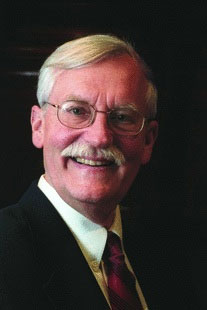by Daniel Hathaway

The Quire Cleveland invitation came about through personal connections, he told us in a phone call from his home in Lexington, MA. “Ross and Bev’s son David sang with the Collegium when he was at Harvard. They came to several concerts and really liked what we were doing, especially with Renaissance polyphony. Interestingly, I had met Bev at workshops I offered in the White Mountains of New Hampshire in the summer of 1979 and 1980. The fact that Ross and Bev went to Stanford the same time I did means that we see things similarly, though they’ve gone much more in depth into musicological areas and I into performance areas. When they came to Cambridge, I would see Ross after concerts and he told me about Quire Cleveland and invited me to come and conduct the group at some convenient time.”
Though Renaissance polyphony is Marvin’s first love and a specialty, Duffin’s proposal of a concert completely devoted to the music of the sixteenth-century Vatican composer Giovanni Pierluigi Palestrina (1525/6-1594) came as a bit of a surprise. “Ross brought a folder of music as well as a CD by a group who alternated the Pope Marcellus mass with motets. I tend to avoid all-Renaissance programs because that’s really not what I want to do, but I had only conducted one movement of the mass before and knew almost none of those motets. It’s just really remarkable, really expressive, quite beautiful music and I’m happy to be doing this.”
Renaissance polyphony is scarce on choral programs these days, Marvin laments, and the music of Palestrina, lionized by scholars in the nineteenth century, has almost disappeared. Too bad in both cases, Marvin says. “It’s music that lifts you to another sort of spiritual level and can provide transcendent moments. That’s what drew me to music as an undergraduate.”
Like the CD that inspired this concert, Quire’s program on May 25 will interleave movements of the Pope Marcellus mass with a number of motets ranging from four to six voices and double choir, mostly unpublished except in scholarly monuments. Duffin has provided practical editions for the occasion.
What is it about this repertory that can elicit such a response from the listener? “I came to realize that what takes you into another world and into a totally euphoric state is the combination of the modes,” Jameson says, referring to the non-tonal scales that the ancient Greeks invented and believed could inspire various emotional states, and which Renaissance composers rediscovered and used to organize their musical material. “Modes don’t clearly confirm an affect or mood like major and minor scales do, but I’m very drawn to the subtle emotions of the modes. Dorian is either half sad or half happy. Phrygian is mostly sad. Lydian is really exotic and Mixolydian is mostly happy.”
Jameson Marvin can easily launch into a whole lecture about how Renaissance music is constructed and how those techniques produce emotional reactions in the listener, but a lot of those techniques are involved in the musical painting of words through dissonance and consonance and changes in the flow of the music: highlighting the name of Mary — to whom most of the motets on the Quire concert are devoted — and portraying verbs through accelerated musical activity.
Though he’s a specialist in what makes Renaissance polyphony tick, Marvin is not a purist when it comes to choral tone. “Who knows how this music was performed? By gosh, there was no recording device there in Rome so we could know what Palestrina’s choirs sounded like. I often wonder when I hear groups where the soprano tone is so pure and straight as a laser beam and men are singing below them with vibrato. It’s fairly obvious they didn’t originally sing that way.”
Jameson Marvin conducts Quire Cleveland in an all-Palestrina program at Historic St. Peter’s Church at 17th and Superior in downtown Cleveland on Saturday evening, May 25 at 7:30 pm. Tickets are available online (under 18 admitted free).
Jameson Marvin will have more to say about Renaissance polyphony and the rich experience of choral singing at Harvard when he speaks at the Spring Dinner of the Harvard Club of Northeast Ohio on Thursday, May 23 at 7:00 pm at the Cleveland Skating Club. Some places may still be available. Email club president Andria Derstine if you’re interested in attending the dinner or the speech that follows.
Published on ClevelandClassical.com May 21, 2013
Click here for a printable version of this article.


